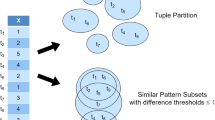Abstract
Functional Dependency is a fundamental notion of the Relational Model. Since the introduction of this successful theoretical framework in the 70’s, there have been several works focussed on their automated treatment. The pioneer line of this area was the use of Functional Dependencies Logics. Unfortunately, this line has presented several limitations, most of them caused by the crucial role of the transitivity paradigm in the axiomatic system. In [11] we introduce a new Functional Dependencies Logic which does not use the transitivity rule. This logic uses a new substitution rule and the design of its axiomatic system has been guided by the notion of optimality.
In this paper we show the advantages of such a logic. We introduce a pre-processing transformation which removes redundancy of a given set of Functional Dependencies and allows a more efficient further treatment by other well known indirect algorithms. Besides that, we carry out an empirical study to prove the practical benefits of our approach.
This work has been partially supported by the Cycit project 1109-2000.
Preview
Unable to display preview. Download preview PDF.
Similar content being viewed by others
References
Torgersen, S.: Automatic design of relational databases, Ph. D. Thesis. TR 89-1038 (1989)
Lee, M.L., Ling, T.W., Low, W.L.: Designing functional dependencies for XML. In: EDTB 2002 Proceedings 2287. LNCS, pp. 124–141.
Armstrong, W.W.: Dependency structures of data base relationships. In: Proc. IFIP Congress, pp. 580–583. North Holland, Amsterdam (1974)
Atzeni And, P., Antonellis, V.D.: Relational Database Theory. The Benjamin/ Cummings Publishing Company Inc. (1993)
Ausiello, G., D’Atri, A., Sacca, G.: Graph Algorithms for Functional Dependenciy Manipulation. J. ACM 30(4) (1983)
Bell, D.A.: From data properties to evidence. IEEE Transactions on Knowledge and Data Engireering 5(6), 965–968 (1993)
Bell And, D.A., Guan, J.W.: Computational methods for rought classifications and discovery. J. American Society for Information Sciences. Special issue on Data Minig (2004)
Buneman, P., Fan, W., SimÉÉ, J.R.O.M., Weinstein, S.: Constraints for semistructured data and XML. SIGMOD Record (ACM Special Interest Group on Management of Data) 30(1), 47–54 (2001)
Choobineh And, J., Venkatraman, S.S.: A methodology and tool for derivation of functional dependencies from business forms. Information Systems 17(3), 269–282 (1992)
Codd, E.F.: The Relational Model for Database Management: Version 2. Addison Wesley, Reading (1990)
Cordero, P., Enciso, M., Guzmán, I.P.D., Mora, A.: SLFD Logic: Elimination of data redundancy in Knowledge Representation. In: Garijo, F.J., Riquelme, J.-C., Toro, M. (eds.) IBERAMIA 2002. LNCS (LNAI), vol. 2527, pp. 141–150. Springer, Heidelberg (2002)
De Miguel, A., Piattini, M., Marcos, E.: Diseño de Bases de Datos Relacionales. In: Ra-ma, ed. (1999)
Diederich And, J., Milton, J.: New Methods and Fast Algorithms for Database Normalization. ACM Transactions on Database Systems 13(3), 339–365 (1988)
Fagin, R.: Functional Dependencies in a Relational Database and Propositional Logic, IBM. Journal of research and development 21(6), 534–544 (1977)
Flach And, P.A., Savnik, I.: Database dependency discovery: A machine learning approach. AI communications 12, 139–160 (1999)
Guan And, J.W., Bell, D.A.: Rough computational methods for information systems. Artificial Intelligence 105, 77–103 (1998)
Huhtala, Y., KÄRkÄInen, J., Porkka, P., Toivonen, H.: TANE: An efficient algorithm for discovering functional and approximate dependencies. The computer Journal 42(2) (1999)
Ibaraki, T., Kogan, A., Makino, K.: Functional dependencies in Horn theories. Artificial Intelligence 108(1-2), 1–30 (1999)
Ibaraki, T., Kogan, A., Makino, K.: On functional dependencies in q-Horn theories. Artificial Intelligence 131, 171–187 (2001)
Lopes, S., Petit, J.-M., Toumani, F.: Discovering interesting inclusion dependencies: application to logical database tuning. Information Systems 27(1), 1–19 (2002)
Mannila And, H., Raiha, K.-J.: Algorithms for Inferring Functional Dependencies from Relations. Data and Knowledge Engineering 12, 83–99 (1994)
Orre, R., Lansner, A., Bate, A., Lindquist, M.: Bayesian neural networks with confidence estimations applied to data mining. Computational Statistics & Data Analysis 34, 473–493 (2000)
Paredaens, J., De Bra, P., Gyssens, M., Van Gucht, D.V.: The Structure of the Relational Database Model. In: EATCS Monographs on Theoretical Computer Science (1989)
Pawlak, Z.: Rough Set: theoretical aspects of reasoning about data. Kluwer, Dordercht (1991)
Ullman, J.D.: Database and Knowledge-Base Systems. Computer Science Press, Rockville (1988)
Author information
Authors and Affiliations
Editor information
Editors and Affiliations
Rights and permissions
Copyright information
© 2004 Springer-Verlag Berlin Heidelberg
About this paper
Cite this paper
Mora, Á., Enciso, M., Cordero, P., Pérez de Guzmán, I. (2004). An Efficient Preprocessing Transformation for Functional Dependencies Sets Based on the Substitution Paradigm. In: Conejo, R., Urretavizcaya, M., Pérez-de-la-Cruz, JL. (eds) Current Topics in Artificial Intelligence. TTIA 2003. Lecture Notes in Computer Science(), vol 3040. Springer, Berlin, Heidelberg. https://doi.org/10.1007/978-3-540-25945-9_14
Download citation
DOI: https://doi.org/10.1007/978-3-540-25945-9_14
Publisher Name: Springer, Berlin, Heidelberg
Print ISBN: 978-3-540-22218-7
Online ISBN: 978-3-540-25945-9
eBook Packages: Springer Book Archive




